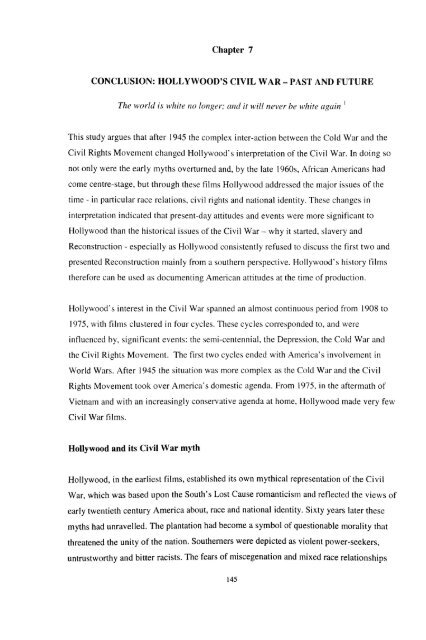- Page 1 and 2:
Greenwich Academic Literature Archi
- Page 3:
REEL WARS: COLD WAR, CIVIL RIGHTSAN
- Page 6 and 7:
ABSTRACTThis study is an examinatio
- Page 8 and 9:
ABBREVIATIONSAMPASAHRBirthCommissio
- Page 10 and 11:
Historians using film as a resource
- Page 12 and 13:
dominated America's foreign policy
- Page 14 and 15:
Mary L. Dudziak explores this relat
- Page 17 and 18:
pure and simple' and were therefore
- Page 19 and 20:
historical texts. Hayden White comp
- Page 21 and 22:
Historians, history films and film
- Page 23 and 24:
How have sympathetic film historian
- Page 25 and 26:
Therefore historians can, with over
- Page 27 and 28:
identity and these were taken as th
- Page 29 and 30:
21 George F. Custen, 'Hollywood and
- Page 31 and 32:
63 Rosenstone, The Historical Film,
- Page 33 and 34:
of Honor dedicated to, and listing,
- Page 35 and 36:
War.....[it] defined us as to what
- Page 37 and 38:
The Civil War and popular cultureJu
- Page 39 and 40:
memory,53 the place where Union and
- Page 41 and 42:
Despite being a new medium Hollywoo
- Page 43 and 44:
From the late 1940s Hollywood was u
- Page 45 and 46:
1 William Faulkner, Requiem for a N
- Page 47 and 48:
36 Blight, Race and Reunion, 77, 81
- Page 49 and 50:
mainly composed of members of the w
- Page 51 and 52:
there was cowardice, it was either
- Page 53 and 54:
This was another Lost Cause myth -
- Page 55 and 56:
stuff with plenty of clothes, rich
- Page 57 and 58:
women into or within slavery. 47 Th
- Page 59 and 60:
departure when, in the discussion o
- Page 61 and 62:
1 William Dean Howells, Los Angeles
- Page 63 and 64:
37 Melvyn Stokes, The Civil War in
- Page 65 and 66:
All races and religions, that's Ame
- Page 67 and 68:
Hollywood almost abandoned Civil Wa
- Page 69 and 70:
charged with disloyalty and silence
- Page 71 and 72:
ecover from the HUAC investigations
- Page 73 and 74:
a living. The daughters grow up to
- Page 75 and 76:
Gettysburg. 'You know,' says Henry,
- Page 77 and 78:
combining two great myths, which co
- Page 79 and 80:
(1948), Tom Dunson's style of autoc
- Page 81 and 82:
Patriotism became a white attribute
- Page 83 and 84:
In the absence of African Americans
- Page 85 and 86:
(Horizons West) and businessmen (An
- Page 87 and 88:
year later, and there was no lead f
- Page 89 and 90:
20 Mary L. Dudziak, Cold War, Civil
- Page 91 and 92:
56 Richard White, 'Western History'
- Page 93 and 94:
7 have seen the promised land.' 'Th
- Page 95 and 96:
those between whites and African Am
- Page 97 and 98:
change, to forget what made him, he
- Page 99 and 100:
eported that the film had 'already
- Page 101 and 102: campaigning for Lincoln. John's rea
- Page 103 and 104: lack/white relationships, in Civil
- Page 105 and 106: McCarthy discredited and a more rel
- Page 107 and 108: dispute which once divided our nati
- Page 109 and 110: pressure, continued to hold. The me
- Page 111 and 112: discrimination, attempts at univers
- Page 113 and 114: talks about Lincoln pleading that '
- Page 115 and 116: creativity. The Confederates use a
- Page 117 and 118: police in Birmingham and Kennedy's
- Page 119 and 120: 1 Martin Luther King Jr.'s, speech,
- Page 121 and 122: 44 Blight, Race and Reunion, 8-11,
- Page 123 and 124: - self-belief, reasons for fighting
- Page 125 and 126: Sexploitation - which reversed the
- Page 127 and 128: would surely recognise the Mexicans
- Page 129 and 130: There are similar examples in Major
- Page 131 and 132: on working class whites nor receive
- Page 133 and 134: The conflict between civil rights a
- Page 135 and 136: e trusted from the wiles of the mis
- Page 137 and 138: field-hands are too valuable an inv
- Page 139 and 140: moving the civil rights agenda to a
- Page 141 and 142: McBurney, even though he is wounded
- Page 143 and 144: Most reviewers were sympathetic, se
- Page 145 and 146: conservatism,' as a natural ally fo
- Page 147 and 148: By the early 1970s, Hollywood's opt
- Page 149 and 150: 20 Enoch, in Friendly Persuasion (1
- Page 151: 62 Johnson called what happened the
- Page 155 and 156: proceed with civil rights legislati
- Page 157 and 158: would have been counter to the poli
- Page 159 and 160: mid-1990s was rejected as the compa
- Page 161 and 162: those historians who were contestin
- Page 163 and 164: 1 James Baldwin, Stranger in the Vi
- Page 165 and 166: 39 Robert Brent Toplin, Reel Histor
- Page 167 and 168: 1210mmmto3sCT>The number of America
- Page 169 and 170: There is a third problem - that of
- Page 171 and 172: the Library of Congress and the Uni
- Page 173 and 174: mainly contain copies of correspond
- Page 175 and 176: killing. There were two other areas
- Page 177 and 178: are 'no compensating moral values a
- Page 179 and 180: epresented.' 32 However, this was t
- Page 181 and 182: Reference has already been made to
- Page 183 and 184: It is in the final period that anti
- Page 185 and 186: 22 Letter from Shurlock to William
- Page 187 and 188: Year Director Company190819091910Ba
- Page 189 and 190: 191119121912Grant and LincolnHe Fou
- Page 191 and 192: 19131913Call to Arms, TheCarpenter,
- Page 193 and 194: 1915 Birth of a Nation, TheColonel
- Page 195 and 196: 19341935193619371938193919401941194
- Page 197 and 198: Searchers, TheShowdown at AbileneTh
- Page 199 and 200: Alien, Robert C., and Douglas Gomer
- Page 201 and 202: Cassidy, John M., Civil War Cinema:
- Page 203 and 204:
Foner, Eric, Who Owns History, (New
- Page 205 and 206:
Landy, Marcia, (ed.), The Historica
- Page 207 and 208:
Prince, Stephen, A New Pot of Gold:
- Page 209 and 210:
Sternsher, Bernard, Consensus, Conf
















